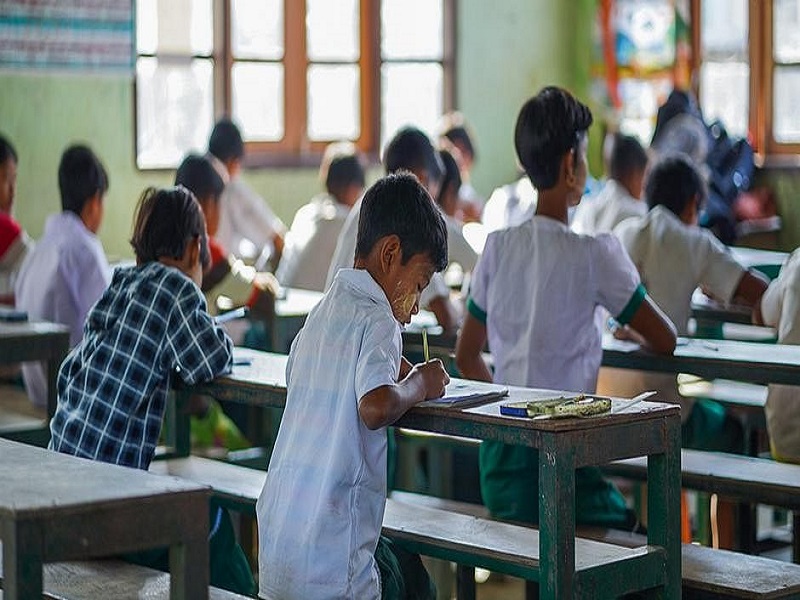The Gujarat Secondary and Higher Secondary Education (Amendment) Act, 2021, which has made it mandatory to clear Teachers' Aptitude Test (TAT) to become teachers and principals in minority educational institutions, has been challenged before the Gujarat High Court as "unconstitutional".
What are the provisions of the amendment Act and why has it been challenged?
What is the amendment?
The Gujarat Assembly passed the Gujarat Secondary and Higher Secondary Education (Amendment) Act, 2021 on March 31 during its budget session, which was notified by the state government on June 1.
The amendment mandates minority institutions -- both religious and linguistic -- to follow a centralised recruitment policy of the state government which is applicable to all government and grant-in-aid secondary and higher secondary schools.
The original Act, the Gujarat Secondary and Higher Secondary Education Act 1972, had exempted minority institutions based on religion and language from provisions of Clause 26 of Section 17 of the Act lays down qualifications, methods of selection and conditions of appointment, promotion and termination of employment and rules for conduct and discipline of the headmaster and the teaching and non teaching staff of registered private secondary schools.
As per the amendment, "sub-section (1) of section 34 and clause (b) of sub-section (1) and sub section (2), (3), (4) and (5) of Section 36 shall not apply to any educational institutions established and administered by a minority, whether based on religion or language".
Section 36 pertains to the "appointment and dismissal, removal and reduction in rank of certain persons-head master, teacher or a member of non teaching staff of a registered private secondary school" while section 34 (1) stipulates "15 per cent of vacancies of teaching staff of a registered private secondary school shall be filled up by persons belonging to the scheduled castes and scheduled tribes. Provided that where a person belonging to a scheduled caste or scheduled tribe is not available for filling any such vacancy the vacancy shall be filled up as otherwise provided in this Act".
How many schools will be impacted by the Act?
As per the state government records, there are a total of 397 secondary and higher secondary schools run by religious and linguistic minority organisations.
Out of a total 5,216 grant-in-aid secondary and higher secondary schools and 1,247 government secondary and higher secondary schools in the state, category wise, there are 300 religious minority and 97 linguistic minority schools that will be affected by this amendment. These include 173 Muslim, 89 Christian, 10 Parsi, 25 Jain, 2 Jew and 1 Sikh schools.
Further, under the linguistic minority category, schools include Hindi (71), Sindhi (13), Marathi (10), Tamil (1), Urdu (1) and Malayalam (1).
What are the reasons that the state government has cited for enacting the Act?
In its Bill presented in the Assembly on March 31, the state government said: "The Supreme Court in the matter of T MA Pai Foundation and Others vs state of Karnataka and others 2002 (8) SCC 481 has held that so far as minority institutions are concerned, the academic standard cannot be lowered in any manner. Regulations can be framed governing service conditions for teaching and other staff of minority educational institutions where the aid is provided by the State without interfering with overall administrative control of the management over the staff. Accordingly, section 40 A of the said Act is proposed to be substituted."
An 11-judge bench in TMA Pai Foundation case (2002) had laid down the principle that rules and regulations would apply equally to the majority institutions as well as to the minority institutions in so far as they further national interest. "Thus, if any regulations seek to ensure the standard of excellence of the institutions while preserving the right of the minorities to establish and administer their educational institutions, such regulations would not violate minority rights under Article 30(1)," the bench had said.
Citing this and Gujarat High Court judgments, Gujarat Education Minister Bhupendrasinh Chudasama, while presenting the bill in the state assembly, had stated that while abiding by the judgments of Supreme Court and Gujarat High Court, a teachers' aptitude test (TAT) is mandatory for minority schools in the state as this will enhance the learning skills of students.
"At present, centralised recruitment process in government and grant-in-aid schools is followed but in minority schools candidates' selection ignores the importance of the TAT exam. Thus, as a result, by not considering TAT exam results, appointment of quality teachers and principals in minority schools is not achieved," Chudasama had stated this in the House.
"But now with the passing of this Bill, the existing centralised recruitment policy for appointment in government and grant in aid schools will be applicable for minority schools too. With this, minority schools will get quality teachers and principals, students will be benefitted," the Minister had said further.
Source: Indian Express 0 COMMENTS


